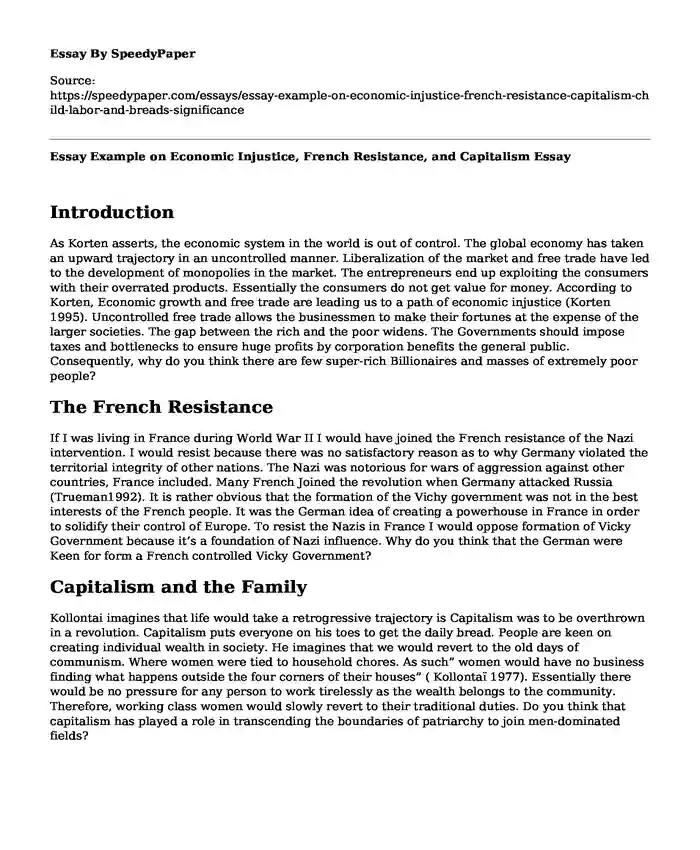
| Essay type: | Reflective essays |
| Categories: | World War 2 Capitalism Economics Food Revolution |
| Pages: | 3 |
| Wordcount: | 714 words |
Introduction
As Korten asserts, the economic system in the world is out of control. The global economy has taken an upward trajectory in an uncontrolled manner. Liberalization of the market and free trade have led to the development of monopolies in the market. The entrepreneurs end up exploiting the consumers with their overrated products. Essentially the consumers do not get value for money. According to Korten, Economic growth and free trade are leading us to a path of economic injustice (Korten 1995). Uncontrolled free trade allows the businessmen to make their fortunes at the expense of the larger societies. The gap between the rich and the poor widens. The Governments should impose taxes and bottlenecks to ensure huge profits by corporation benefits the general public. Consequently, why do you think there are few super-rich Billionaires and masses of extremely poor people?
The French Resistance
If I was living in France during World War II I would have joined the French resistance of the Nazi intervention. I would resist because there was no satisfactory reason as to why Germany violated the territorial integrity of other nations. The Nazi was notorious for wars of aggression against other countries, France included. Many French Joined the revolution when Germany attacked Russia (Trueman1992). It is rather obvious that the formation of the Vichy government was not in the best interests of the French people. It was the German idea of creating a powerhouse in France in order to solidify their control of Europe. To resist the Nazis in France I would oppose formation of Vicky Government because it’s a foundation of Nazi influence. Why do you think that the German were Keen for form a French controlled Vicky Government?
Capitalism and the Family
Kollontai imagines that life would take a retrogressive trajectory is Capitalism was to be overthrown in a revolution. Capitalism puts everyone on his toes to get the daily bread. People are keen on creating individual wealth in society. He imagines that we would revert to the old days of communism. Where women were tied to household chores. As such” women would have no business finding what happens outside the four corners of their houses” ( Kollontai 1977). Essentially there would be no pressure for any person to work tirelessly as the wealth belongs to the community. Therefore, working class women would slowly revert to their traditional duties. Do you think that capitalism has played a role in transcending the boundaries of patriarchy to join men-dominated fields?
Living Standards of Children During Industrial Revolution
Working children lived destitute lives during the Industrial Revolution. There was need to ensure that they get proper housing and food during the revolution. It is rather obvious that children from workhouses and orphanages offered cheap labour (Brown 2019). It would have been more human to remunerate them instead of taking them as a property of the moguls. Their master should have at least provided essentials like clothing and cutlery. In this way such children could live a decent human life. Beastly act of stripping teenage girls in factories should have been criminalized. Additionally, children working in textile factories face health hazards and deformities. Do you think it was fair to take children as laborers in the first place?
Importance of Bread
Today, bread is not as important as it was in the 18th century. Bread was the only readily available commodity for peasants then (Lynn 2015). A peasant could consume up to three breads in a day. It could give them the energy required to work. However, today there are many other available food substances that can substitute bread. Although it is not as expensive as it used to be, people have shifted to more nutritious foods like tubers. People today consume a balanced diet that consists of fruits, meat, and cereals. Why do you think peasants mainly consumed bread as their daily meal in the 18th Century?
References
Brown, J. (2019). A Memoir of Robert Blincoe, an Orphan Boy. Good Press.
Kollontai, A. (1977). Selected Writings of Alexandra Kollontai. Lawrence Hill Books.
Korten, D. C. (1995). When corporations rule the world. European Business Review.
Lynn, M. R. (2015). The sublime invention: ballooning in Europe, 1783–1820. Routledge.
Trueman, CN. (1992). The rise and fall of West European communism 1939-48. Contemporary European History, 139-169.
Cite this page
Essay Example on Economic Injustice, French Resistance, and Capitalism. (2023, Oct 05). Retrieved from https://speedypaper.net/essays/essay-example-on-economic-injustice-french-resistance-capitalism-child-labor-and-breads-significance
Request Removal
If you are the original author of this essay and no longer wish to have it published on the SpeedyPaper website, please click below to request its removal:
- Free Essay Sample Concerning Hate Crimes
- Diversity in Education, Essay Sample
- Civil War Essay Sample: Crittenden Compromise and Missouri Compromise
- The Current Immigration Policy, Free Essay for Students
- Karl Marx and Capitalism, Free Essay for Everyone
- Essay Example on The Beginning of Slavery in America
- Free Essay. How Social Media Creates Isolation Among Young Teens and Youths
Popular categories




